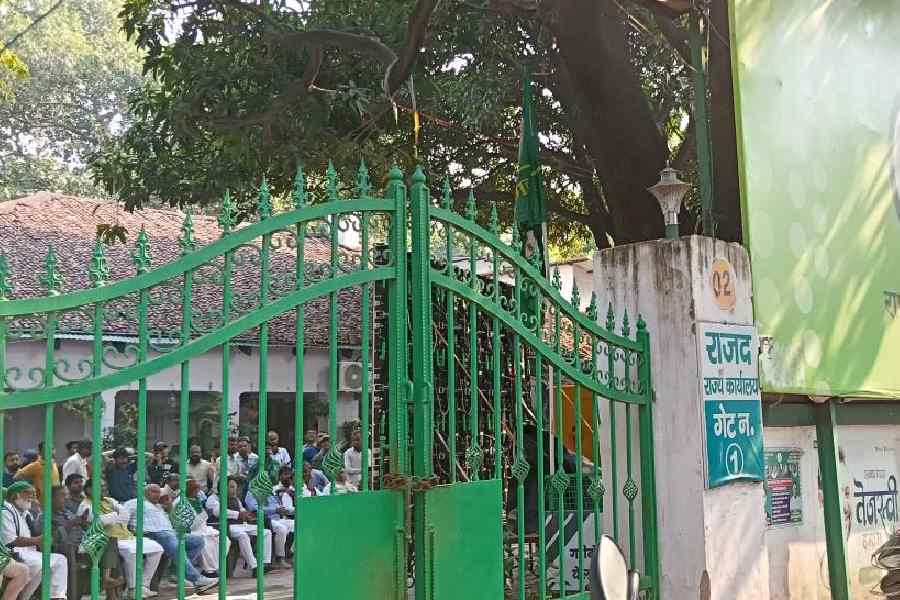RJD leader Tejashwi Yadav had displayed unshakeable conviction when he announced on Thursday that he would take oath as Bihar chief minister on November 18. By Friday evening, that confidence lay in tatters.
As the results of the Bihar Assembly election trickled in, the RJD mascot was struggling to retain even the status of the leader of the Opposition. His party’s seat count hovered around 25 in the 243-member House, barely crossing the 10 per cent mark required to hold the post.
It was the RJD’s worst performance after the 2010 debacle. Tejashwi’s parents Lalu Prasad and Rabri Devi had dominated state politics in the 1990s and early 2000s before being unseated by Nitish Kumar in 2005 in alliance with the BJP.
Tejashwi, who had come close to power in the 2020 polls, witnessed his fortunes crumble. His key promise — one government job for every Bihari family — failed to resonate with voters who delivered a decisive rebuff. Even in his home turf Raghopur, he trailed for hours before pulling ahead of the BJP’s Satish Kumar by a margin of over 12,000 votes.
A deep sense of despair gripped the Yadav residence in Patna, where not a single family member stepped out to address reporters. At the RJD office on Birchand Patel Path, leaders stared in disbelief at the giant television screens that flashed the tally.
A party worker, stunned into silence, could only mutter: “Kya malum aisa kaise ho gaya (Don’t know how it happened).”
Another lashed out: “Pura vote chori ho gaya (All votes have been stolen).”
With the RJD’s vote share slipping to around 22 per cent, even its core Muslim-Yadav (MY) base appeared to have frayed. The 2023 caste survey had pegged Yadavs at 14 per cent of the population and Muslims at nearly 17 per cent, giving the RJD a theoretical cushion of about 30 per cent. Friday’s numbers told a different story.
Senior leaders privately admitted that Tejashwi had failed to shake off the “Jungle Raj” image associated with his parents’ tenure, which the BJP relentlessly invoked to warn voters of a return to lawlessness. Non-Yadav OBCs, they conceded, appeared to have drifted away. “The BJP’s campaign worked. It scared them off the lantern,” an RJD leader said.
Even during the Lalu-Rabri years, allegations of “gundagardi” by sections of the dominant Yadav community had driven extremely backward castes into Nitish’s camp. Tejashwi’s outreach could not win them back.
To widen the MY alliance, Tejashwi had brought in Mukesh Sahani’s Vikasheel Insaan Party (VIP) and even projected Sahani as deputy chief minister. But senior RJD leaders now admit that Mallah voters did not rally behind the alliance. “The results make it obvious,” one leader said. Sahani’s party failed to win any of the 15 seats it contested.
Sahani, who proclaimed himself as “son of Mallah”, sought to blame the voters for the poor show. “We fought for the public and fulfilled our duty by making people aware of everything. The public couldn’t understand and gave their mandate to the BJP and Nitish,” he told reporters in Patna. He said the women had “blindly” voted for Nitish after getting a one-time dole of ₹10,000.
The poll debacle has also revived fears of deepening fissures within the Lalu family. Tejashwi’s elder brother Tej Pratap had rebelled and contested against the RJD. On Friday, he lost the Mahua Assembly seat but ensured the defeat of the RJD’s sitting candidate there. The LJP’s Sanjay Kumar Singh emerged victorious.
After the defeat, Tej Pratap took a swipe at Tejashwi in a Facebook post. “Tejashwi has become ‘Fail-shavi’ (failure). The traitors have hollowed out the RJD,” the post said.
Among Lalu’s daughters, Misa Bharti and Rohini Acharya have long been active in party affairs. In the run-up to the polls, Rohini had openly voiced displeasure over the growing clout of Tejashwi’s aide Sanjay Yadav, even as Misa backed her younger brother.
With the RJD facing its worst crisis in decades, those internal tensions may now burst out into the open.










